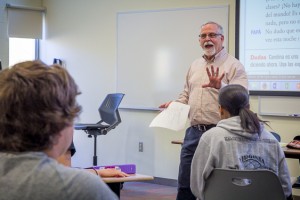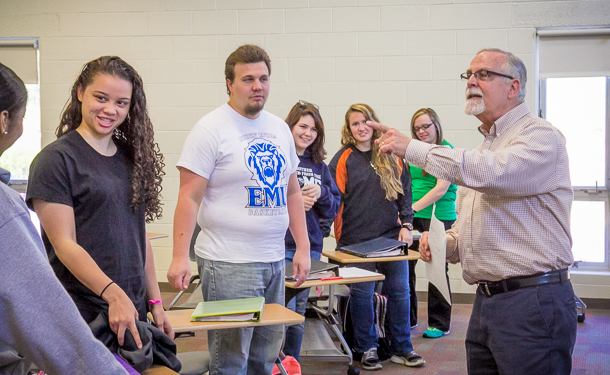In this blog post, Professor Don Clymer reflects on leading, witnessing and participating in a simple practice in the classroom, and the “wonderful gift of love” that students share through their own transformation and reflection. In the required Senior Seminar, which Clymer has taught at Eastern Mennonite University (EMU) for nine years, seniors “review their faith development, their cross-cultural experience and their vocational calling,” he writes. Many are affirmed in their faith and its power to sustain them in difficult times.
That gift of sharing is all the more meaningful, Clymer writes, because this is the last Senior Seminar he will teach. Clymer, a professor of language and literature, will retire at the end of the spring 2016 semester. He came to EMU in 2001 as cross-cultural director after teaching at Hesston College and working as director of communications for Virginia Mennonite Conference and Board of Missions. In 2006, he returned to the classroom.
The post, from Don’s blog “Klymer Klatsch,” was shared around campus and on Facebook.
***

Henri Nouwen, prolific Catholic author of books on spirituality, frequently made the case for telling yourself: “You are beloved of God.” Over his short life, Nouwen struggled mightily with believing that he indeed was beloved of God. It was because of sharing from his deepest and darkest self in total vulnerability that he connected with millions of people around the world. Pastors of all denominations listed him as the person most read after the Bible.
In a course that I teach with a colleague on dealing with suffering and loss, at the end of the year, during our final exam, we have students face each other in inside/outside circles, look each other directly in the eye, and state to each other: “You are beloved of God.” They continue moving to several other students around the circle, then we open it up to anyone. It has a powerful effect. It is almost magical. There is laughter, there are hugs and there are tears.
I have become convinced that our U.S. American culture teaches us to be self-loathing. We get messages from everywhere that we are not good-looking enough, not talented enough, not intelligent enough, not wealthy enough, not spiritual enough. We always compare ourselves with those who excel in the areas where we feel lacking; we never look at those who have less in any given category. The result is thinking that we can never measure up. The advertising industry is astute in capitalizing on this self-hate by providing us with products that will, according to their pitch, make us all the things that we are not.
The magic of the phrase “You are beloved of God,” as we do it in our class, comes about because it is given freely as a gift. The eyes are a window into the soul, and looking into each other’s eyes while stating this simple phrase goes directly to the soul. It connects on a very deep level. It helps us to realize that in God’s eyes, we don’t have to measure up to any artificial cultural standard. He loves us as we are.
We had 43 students in our course. It is part of the general education program at Eastern Mennonite University where I teach. It is called the Senior Seminar, and during the semester, they are to review their faith development, their cross-cultural experience and their vocational calling while at EMU.
For their final, we asked them to reflect on what they had learned in the course, and what they will take with them as they graduate. I was overwhelmed with the gift of love I received from their reflections. Since I will be retiring after this academic year, this is the last time I will be teaching the course. I will forever treasure this gift to me.
Here are a few snapshots of their final reflections:
- “I learned that I don’t have to fix someone’s pain, that being present with them in silence is enough.”
- “I will never forget the phrase ‘hurt people hurt people.’ I am hurt and I now realize how I am hurting others.”
- “I became aware of the poison of unforgiveness. I have had to forgive someone who wronged me.”
- “I learned that there are many areas in my life that I need to let go. I cannot always be in control.”
- “I learned that community and our ‘cloud of witnesses’ is very important in dealing with our pain.”
- “I will always remember that I am beloved of God.”
Variations on these statements were repeated numerous times.
What touched me the most, however, were the statements made about their faith. Nearly a half-dozen students said that they returned to a lost faith through the course. One said that she was afraid to talk about her faith thinking that she would be rejected, but she felt affirmed in her unusual spirituality through the course. Most said that their faith was strengthened, that they wanted to commit to deeper spiritual practices like prayer, Bible study, walks in nature and sitting in silence.
Over the nine years that I have taught this course, there have been many satisfying moments. There have also been ugly moments, perhaps to be expected in a required course. Yet today’s final exercise will forever be etched in my mind as one of the most positive outcomes I have experienced. Thank you, students, for this wonderful gift of love. “You are beloved of God!”

Ich wünsche dir und deiner Familie frohe Weihnachten und ein gutes neues Jahr, das Jahr der Pensionierung.
Liebe Grüsse
Dein Schwager Fritz